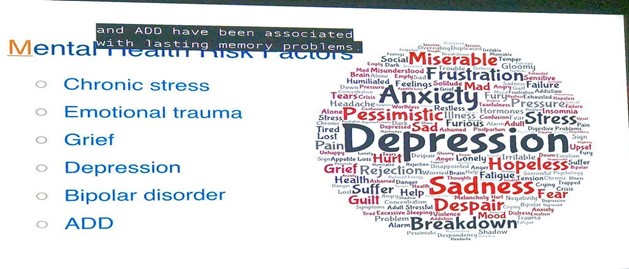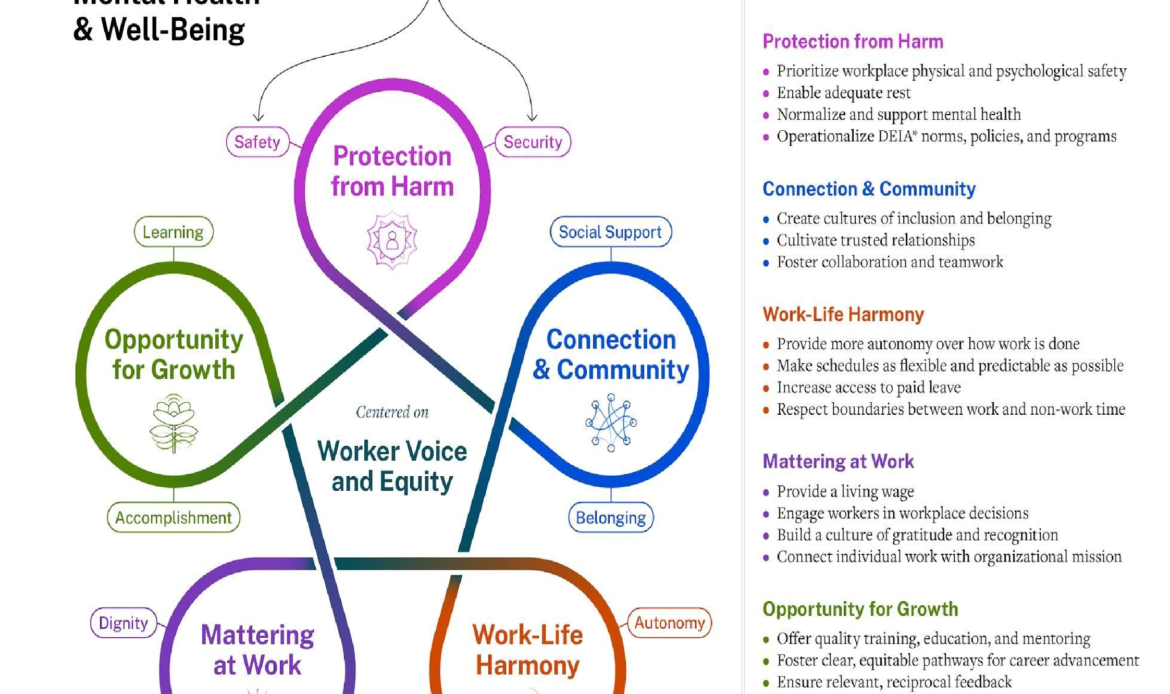In commemoration of today’s World Health Day
In the dynamic world of today’s workplaces, fostering mental well-being has become not just a priority but a necessity. For many of us, work plays a significant role in our lives, providing income, structure, and social connections. Beyond the financial advantages, employment offers structure, purpose, and a sense of identity. It can boost self-esteem and provide important social connections. A fulfilling job can greatly benefit our mental health and well-being.
Furthermore, to provide a mentally thriving workplace, we need to break down walls with our team, foster trust, and build a circle of allies who have our back on the toughest days. By strengthening workplace connections, we create an environment where everyone can thrive – mentally, emotionally, and professionally. Real success happens when mental health and teamwork go hand in hand!
Working with a mental health condition can be challenging. However, It’s essential that workplaces foster a mentally friendly environment where everyone can thrive a responsibility shared by both employers and employees. As companies increase awareness about mental health, they’re encouraging employees to seek treatment amidst rising rates of stress, depression, addiction, and suicides. Such issues drive up healthcare costs, and workplace conversations around mental health remain difficult due to the stigma that views these conditions as personal failings rather than medical issues.

Before exploring this topic, Let’s understand the definition of mental health. According to the World Health Organization (2001),
“Mental health is “a state of well-being in which the individual realizes his or her own abilities, can cope with the normal stresses of life, can work productively and fruitfully, and is able to make a meaningful contribution to his or her community.”
In a nutshell, Mental health refers to our thoughts, emotions, and ability to cope with life’s challenges. Just like physical health, we all have mental health. When it’s in a good state, we feel purposeful, energized, and capable of handling life’s ups and downs.
Mental health is a critical issue in Nigeria, with one in four people developing mental illnesses or behavioral problems over their lifetime. Over 50 million Nigerians suffer from mental disorders, with 20-30% suffering from mental disease. In 2019, a survey revealed low mental health awareness in Nigeria, with most respondents blaming mental health issues on factors like drug abuse, or evil spirits, leading to spiritual interventions at prayer houses.
Nigeria’s President Muhammad Buhari signed the National Mental Health Act 2021 on January 5th, 2023 in a landmark move aimed at fostering inclusivity and prioritising mental well-being in the workplace. This law not only establishes a unified approach to mental health services but also safeguards fundamental human rights for individuals with mental health conditions. The National Mental Health Act 2021 has provided legal Protections for Mental Health in the workplace, from basic human rights to health and safety regulations. The National Mental Health Act 2021 provides additional protections for those with long-term mental health conditions, classifying them as disabilities. This ensures individuals are protected from discrimination and harassment and are entitled to reasonable workplace adjustments to accommodate their needs.

Key risks of Mental Illness
Experts attribute that people are at risk of the likelihood of developing mental illness due to poverty, genetics, trauma, discrimination, chronic illness, social, or environmental factors, though anyone can be affected. Mental health advocates stress that these conditions should be treated like any other illness, highlighting the need for empathy and support.
Occasional feelings of stress, sadness, or fear are normal. However, when these emotions persist, they can develop into more serious mental health issues like anxiety or depression, which may interfere with daily life. Mental health conditions can range in complexity, with some individuals requiring ongoing support and treatment.
Impacts of Poor Working Conditions on Mental Health
Globally, poor working conditions, such as discrimination, job insecurity, and excessive workloads, pose significant risks to mental health. In 2019, 15% of working-age adults had a mental disorder, with depression and anxiety alone costing $1 trillion annually in lost productivity. Effective workplace actions can prevent mental health risks, promote well-being, and support workers with mental health conditions. Safe, healthy work environments not only reduce tension and conflict but also improve performance, retention, and productivity.
Risks to mental health at work include under-utilized skills, excessive workloads, inflexible hours, lack of job control, harassment, discrimination, unclear roles, and job insecurity. To address these risks, government, employers, and stakeholders must take steps to prevent mental health conditions, promote mental well-being, and support workers’ inclusion and recovery.
Why is disclosure challenging for people living with mental illness?
For individuals managing mental illness, however, disclosing their condition in the workplace is often a complex, personal decision. Many opt not to disclose their mental health status for several reasons:
Performance:
- They can effectively manage their job without needing to inform their employer.
- They have established support systems outside of work.
Attitudes:
- Fear that disclosing their condition will cause unnecessary concern.
- Concerns that managers may have misconceptions about mental illness.
- Worries about being treated differently by colleagues.
- Difficulty accepting their own diagnosis.
- Fear of being marginalized due to stigma surrounding mental health.
Discrimination:
- Past experiences of discrimination or exclusion at work.
- Concern that managers may focus on their disability rather than their abilities.
- Anxiety over being treated negatively by management or peers.
- Fear that their condition could be viewed as a liability or financial burden.
- Worries about being overlooked for promotions or losing their job entirely.

How to Look After Your Mental Health at Work
Improving your mental health and building resilience at work takes effort, especially when you are living with a mental health condition. However, practising self-care is key to maintaining well-being. Here are a few simple steps you can take:
1. Talk About Your Feelings
Sharing your feelings can help you manage stress and maintain mental health. While it may be difficult to open up at work, having someone you trust—a colleague, manager, or friend—can be a great support. If you’re uncomfortable discussing work pressures at the office, lean on family or friends outside of work for support.
2. Stay Physically Active
Regular movement improves self-esteem, concentration, and sleep. It doesn’t have to be intense exercise—even light physical activity each day can make a difference. Incorporate activities you enjoy, such as walking or stretching, into your daily routine.
3. Eat Well
Nutrition affects both physical and mental health. While busy work schedules can disrupt healthy eating habits, aim for regular meals and plenty of water. Planning meals can help you stay on track. Be mindful of others’ food choices and respect any discomfort they might have around work meals, especially those with past or current eating disorders.
4. Drink Sensibly
While many people may turn to alcohol to cope with stress or anxiety, it’s important to be mindful of how much you consume, especially at work-related events. Drinking may temporarily ease nerves, but it can lead to increased anxiety or unwanted behavior. Moderation is key.
5. Ask for Help
No one is invincible, and it’s okay to seek support when feeling overwhelmed. Many workplaces offer confidential services such as employee assistance programs or health insurance that can provide mental health support. Don’t hesitate to consult a mental health specialist who can guide you towards the appropriate care.
6. Manage Your Relationships
Healthy relationships are essential to our mental well-being. A supportive team at work makes a huge difference, but work politics and difficult interactions can create tension. It’s helpful to find trusted colleagues or a mentor to talk through any challenges, and it’s equally important to maintain relationships with friends and family outside of work.
7. Take Breaks
Regular breaks are crucial for mental health. Whether it’s a short pause during your workday, a proper lunch break, or a weekend away, taking time off helps recharge your mind. Ensure you’re getting enough sleep (preferably 7- 9 hours) and plan leave throughout the year to maintain a healthy balance between work and rest.
8. Engage in Activities You Enjoy
Doing something you’re good at or enjoy can greatly reduce stress. Whether it’s a hobby like gardening, puzzles, or creative pursuits, engaging in activities you love can help shift your mood and provide a sense of accomplishment.
9. Accept Yourself
Embracing who you are, with all your strengths and weaknesses, is important for mental health. Building self-esteem beyond work achievements helps you handle setbacks and navigate life’s challenges with confidence.
10. Care for Others
Caring for others, whether through your work or in your personal life, can be fulfilling and boost mental well-being. Offering support to colleagues or friends, and maintaining empathy in the workplace, fosters stronger relationships and a more supportive work environment.
By incorporating these strategies into your daily routine, you can improve your mental health and resilience, both in and outside the workplace. These steps can help you take control of your mental health at work, promoting overall well-being and resilience.

How to provide support for a colleague who lives with mental health conditions
Supporting a colleague with their mental health can be a delicate but important task. Here are some key steps to help you approach the situation:
1. Create a Safe Space for Conversation
Start by asking how your colleague is doing in a warm and genuine way. Find a private, comfortable setting where you both feel at ease. Avoid rushing, and give them your full attention, free from interruptions.
2. Use Active Listening
Active listening is crucial. Maintain eye contact (unless it makes them uncomfortable), use open body language, and acknowledge their words with nods or affirmations. Repeat what they say to confirm you’ve understood correctly, and ask direct but respectful questions. Summarize the conversation at the end to ensure clarity and follow through on any commitments made.
3. Manage Your Reactions
Hearing difficult things can be challenging, but it’s essential not to show surprise or judgment. Reassure your colleague that it’s okay to talk to you, and respect their feelings. Resist the urge to immediately offer solutions—sometimes they may just need to talk rather than seek advice.
4. Address Thoughts of Suicide
If you’re concerned that a colleague might be having suicidal thoughts, it’s okay to ask them directly, “Have you had thoughts about suicide?” If they confirm they are struggling, encourage them to seek professional help. Offer to help them contact a mental health specialist, doctor, or a close friend. If their safety is at risk, take immediate action, such as escorting them to a clinic for support.
By showing empathy, patience, and understanding, you can offer meaningful support to a colleague going through a tough time.
Checklist for Creating Mentally Healthy Workplaces:

Prioritize Mental Health as a Business Asset: Employers should recognize mental well-being as a key driver of success and innovation within your organization. Workplaces should improve mental health literacy and reduce stigma in the workplace by training themselves to keep abreast, recognize, understand, and respond to mental health issues.
- Foster Compassionate Leadership: Employers should empower superiors and managers to build supportive, empathetic relationships with their teams, ensuring a healthy and productive work environment.
- Tackle Discrimination Head-On: Proactively combat stigma and discrimination by creating a workplace where everyone feels respected and included.
- Embrace Diversity and Lived Experiences: Value the unique strengths and skills that come from lived experiences with mental health challenges, and encourage open, supportive conversations.
- Employers can provide stress management tools and promote physical activities for workers.
- Employers should encourage meaningful involvement of workers and those with lived experiences are crucial in creating an environment that protects and promotes mental health at work.
Resources/ references
- Theresa Agovino, (2020, March 27). Strategies to manage Mental
Illness at Work.
https://www.shrm.org/topics-tools/news/all-things-work/mental-illness-work place
- World Health Organization (2024, September 4). Mental health at work https://www.who.int/news-room/fact-sheets/detail/mental-health-at-work
- Mental Health Foundation (unknown) How to support mental health at work. https://www.mentalhealth.org.uk/explore-mental-health/publications/how-su pport-mental-health-work






